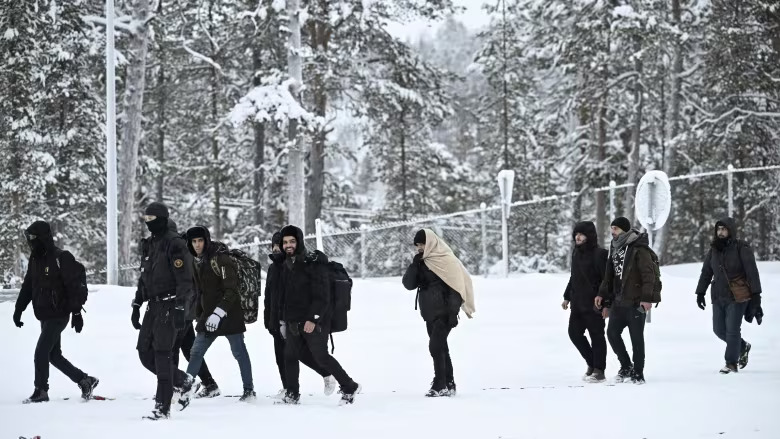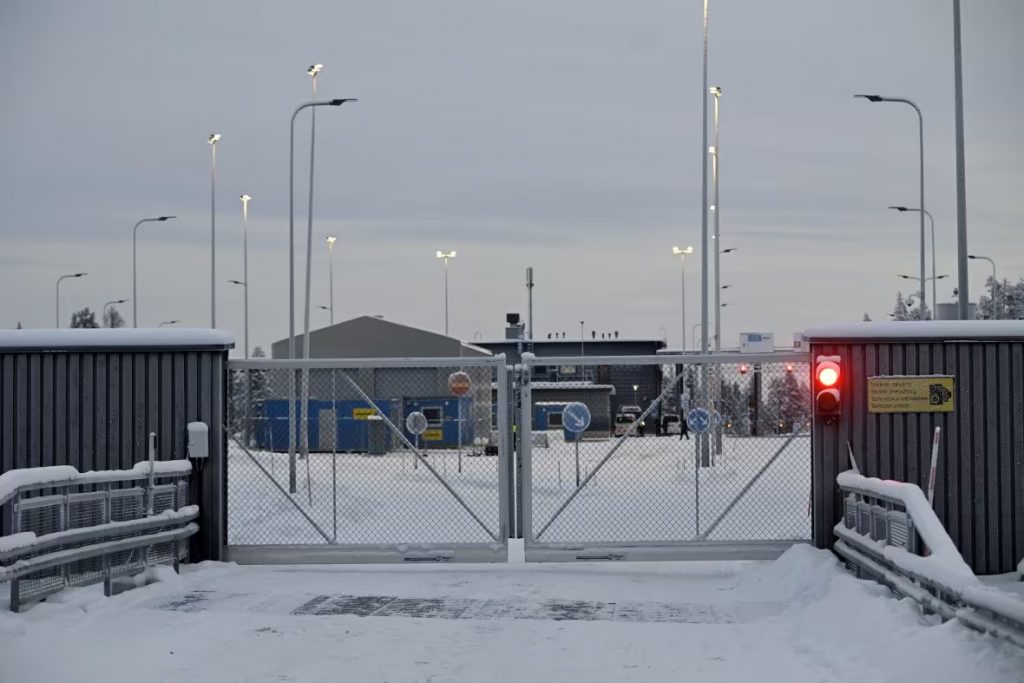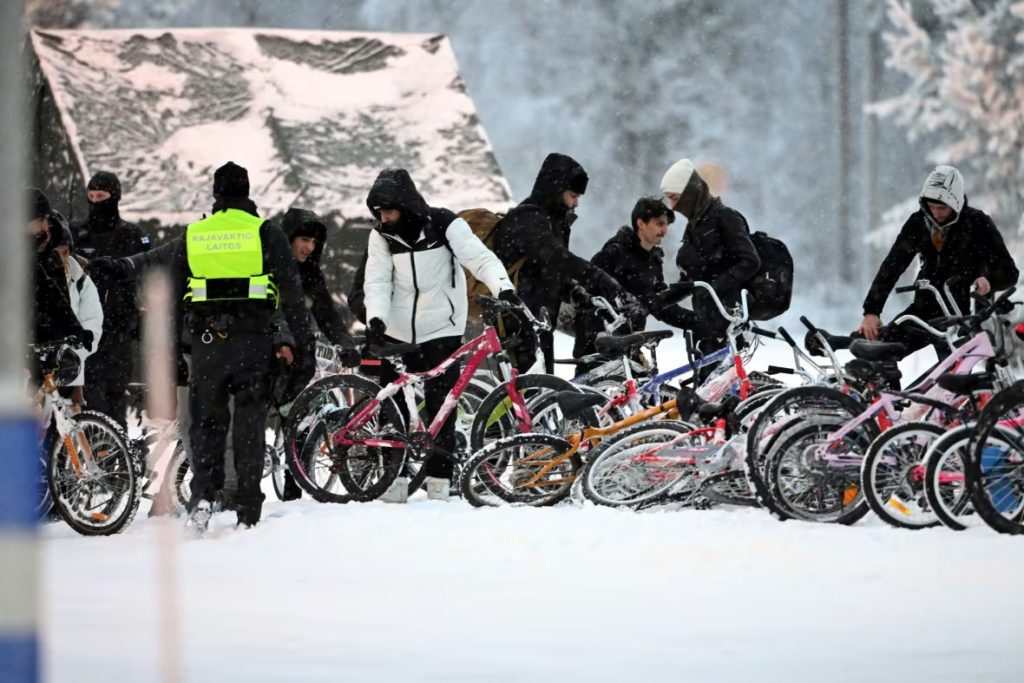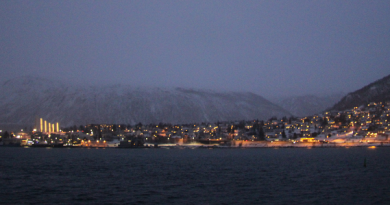Finland’s border closure explained

Crossings to be shut for at least 2 weeks following surge of migrants trying to enter from Russia.
Finland is temporarily shutting down its 1,340-kilometre long eastern border with Russia after seeing an abnormally large number of migrants arrive this month — a situation its prime minister describes as a “hybrid attack” orchestrated by Moscow.
Finnish officials have accused Russia of guiding third-country migrants to its border crossings to manufacture a crisis, as a possible retaliation for joining NATO earlier this year.
“We don’t accept any attempts to undermine our national security,” Prime Minister Petteri Orpo said Tuesday at a news conference in Helsinki.
Moscow has denied the allegation and Finland’s move may not be acceptable under international law.
Here’s what is happening at Finland’s border with Russia — and why it’s a concern.
What has been happening?
The Raja-Jooseppi checkpoint is Finland’s northernmost border crossing with Russia and the only one that remained open until this week. Seven others have been closed since Nov. 18.
Migrants arriving there do so in frigid Arctic weather with less than three hours of daylight.

Once it closes Wednesday night, the only way migrants will be able to seek protection in Finland will be via air and maritime points of entry.
The government says the entire border with Russia will remain closed until at least Dec. 13.
According to official statistics, more than 800 asylum seekers — mainly from countries like Syria, Iraq, Afghanistan, Yemen and Somalia — have arrived at Finland’s border crossings in November alone. There were only 100 between August and November.
Orpo said shuttering those border crossings is “a necessary and proportionate measure” and that border authorities warn the situation may “intensify even more” otherwise.
“Intelligence information from different sources tells us that there still are people on the move,” Orpo said on Monday.
Is Finland the only country concerned?
Estonia, also a NATO member, made a similar claim last week when Defence Minister Hanno Pevkur described an influx of migrants as a “fully state-orchestrated” operation by Russia.
Last week, the border crossing in the city of Narva, linked by bridge with Ivangorod in Russia, recorded 30 arrivals over the course of a few days, all of which were sent back, according to Estonia’s public broadcaster ERR.
Estonia says it has been preparing for such a situation for some time, having seen a similar tactic play out with Russia’s staunch ally Belarus, which has put similar pressures on its neighbours Poland, Latvia and Lithuania.
The situation along Finland’s border gave Estonia further cause for concern.
“All these hundreds of migrants are ending up in one border crossing point in Finland with bicycles during the wintertime,” Pevkur said at a news conference in Stockholm last week.
“Come on, seriously?”

Syrian asylum seekers told Finnish public broadcaster YLE that Russian authorities had facilitated their crossings — including forcing them to pay for bicycles.
Norway, on the other hand, a neighbour of both Finland and Russia, says it has experienced no irregularities on its border.
Why is this considered a threat?
Migration pressure is seen as a threat because it risks pushing democracies to abandon some of their commitment to provide asylum, thereby exposing the fragility of democratic systems.
Europe has been under heavy migration pressure for years, triggering a backlash in many places against migrants that has also strengthened far-right political parties.
In Poland, the border crisis that has been blamed on Belarus deepened pre-existing social divisions, pitting those seeking a tough stance on migration against those favouring a more accepting approach.
The government, at the time, accused those of siding with migrants as unwittingly helping hostile foreign powers.

How is Russia responding?
The Kremlin has denied doing anything nefarious at its border with Finland and called claims it’s weaponizing migrants “completely baseless.”
Earlier this month, following the initial rise in border closings, Russian media reported presidential spokesperson Dmitry Peskov saying Russia “has never in its recent history threatened Finland.”
He said the situation was disappointing and that the country’s long-standing relationship with Finland has “been replaced by an entirely Rusophobic position.”
In April, the Kremlin called Finland’s accession to NATO a dangerous mistake and cautioned it would be forced to take “counter-measures” in response.
Can Finland do this?
The Finnish government insists it is within its rights to take such a drastic step to secure its borders, but UN agencies suggest that may not be the case.
A “complete closure” of a border that bars asylum seekers “would be contrary to international law and to the principle of non-refoulement,” according to a recent post on the matter by the United Nations High Commission for Refugees (UNHCR) in Nordic and Baltic countries.
That principle is a binding obligation “not to remove any person to a country where [they] would face torture, cruel, inhuman or degrading treatment or punishment or other irreparable harm.”
It can apply to deportation or expulsion and to “non-admission at the border,” the UNHCR said.
Related stories from around the North :
Finland : Finnish Government implements two-week border closure with Russia, The Independent Barents Observer
Norway : Border trouble not on agenda when FSB boss visited Norway, The Independent Barents Observer
Russia : Cabinet postpones meeting on border crossings; Russia ‘deeply regrets’ Finnish moves, Yle News



